by Scott Keeter
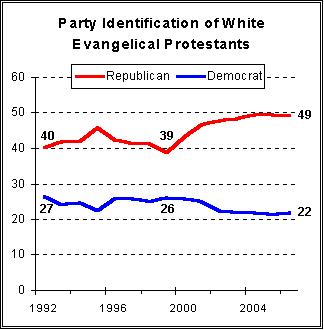
White evangelical Protestants have become one of the most important parts of the Republican Party’s electoral base, making up over one-third of those who identify with the GOP and vote for its candidates. The party’s political fortunes depend, in large part, on retaining the solid support of the evangelical community. But evangelicals, like other voters, have been affected by the broader wave of voter disillusionment with President Bush and the Republican Party. Evangelicals remain the party’s most supportive group, but at levels significantly diminished from where they were in the 2002 and 2004 elections.
The following is an update of Pew’s report of May 2, which showed that Bush’s image among evangelicals, while still positive, had declined from just a year and a half earlier. At that time, however, there was little evidence that Bush’s troubles during the fall of 2005 and early 2006 were eroding support for the party. See “Will White Evangelicals Desert the GOP?”
Party Affiliation and Images of the GOP
From 1999 to 2004, the number of evangelicals identifying themselves as Republicans grew dramatically, rising from 39% in 1999 to 47% in 2001 and peaking at 49% in 2004 and 2005. Given how slowly party affiliation in the American public tends to change, this level of movement among evangelicals was startling.
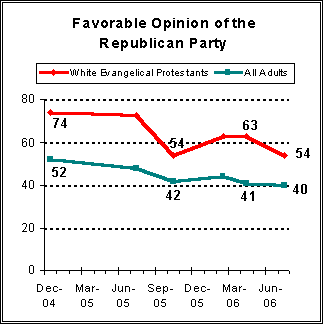
While there has been no significant change in party affiliation this year, there are other signs of evangelical frustration with the party. The number of evangelicals who have a favorable opinion of the GOP stood at 74% in the aftermath of the 2004 election. But it dropped to 54% last fall in the aftermath of Hurricane Katrina, before recovering to 63% earlier in 2006. By July of this year, however, it had declined to 54%, as the party’s image with the public overall dimmed to 40% favorable.
This year, there also has been a significant downturn in the number of evangelicals who believe the Republican Party “governs in an honest and ethical way.” In January 2006, a majority of evangelicals (55%) said that this phrase better described the Republican Party than the Democratic Party. In a poll conducted this month, however, just 42% of evangelicals still held this view a drop of 13 percentage points. Over this period, evangelicals did not become more likely to apply the ethical label to the Democratic Party; instead, more had no opinion or said neither party was well described this way.
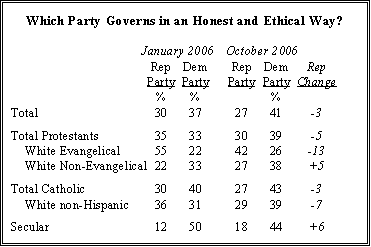
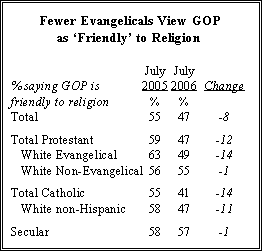
Evangelicals also became less likely over the past year to say that the Republican Party was “religion friendly.” In a July 2006 poll, 49% of white evangelicals described the GOP as friendly to religion, a decline of 14% from one year earlier.
Evangelicals and President Bush
President Bush received a striking 78% of the votes of white evangelicals in 2004, up 10 percentage points from 2000 and by far his highest level of support from any demographic group in the population. As he began his second term in office, the president had an approval rating of 72% among evangelicals, compared with 50% in the public as a whole.
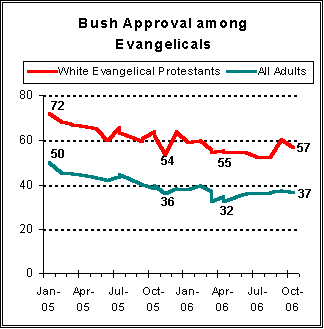
But evangelicals’ ratings of the president have declined as much since January 2005 as they have among the rest of the public. One year ago in the aftermath of the federal government’s response to Hurricane Katrina, just 54% of evangelicals approved of Bush’s performance in office; his overall approval rating was 36%. Since then, the president’s ratings among evangelicals have fluctuated, rallying to 64% in December 2005 and slumping to a low of 52% in July of this year. Today, Bush’s rating among evangelicals is 57%, compared with 37% among the public overall.
The 2006 Congressional Vote
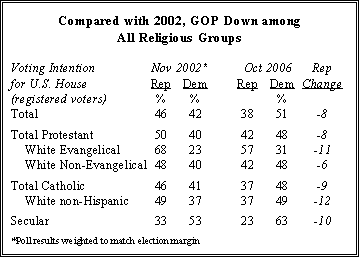
The key political question is how the changing opinions about the president and the party will affect next month’s races for the House and Senate. In Pew’s most recent election survey, conducted September 21-Oct. 4, registered voters favored a Democratic candidate for the House over a Republican candidate by a margin of 51% to 38%. This reflects an eight-point drop from the level of support for Republican candidates on the eve of the 2002 congressional election.
Of all religious groups in the current survey, white evangelicals are the most supportive of Republican candidates 57% say they will vote Republican, 31% Democratic. But this represents a significant decline from the estimated 68% who favored Republicans on the eve of the 2002 congressional elections, and is also lower than in a Pew poll last month when 64% of evangelicals said they intended to vote for the GOP. (In 2004, exit polling showed that 74% of white evangelicals voted Republican in House races, but the context is somewhat different in a presidential election year.) Support for Republicans is down an equivalent amount among nearly all religious groups, compared with 2002. Among white Catholics, 37% say they will vote Republican (compared with 49% in 2002), and the number of white mainline Protestants intending to vote Republican is down six points (from 48% in 2002 to 42% now).
White evangelical Protestants continue to be among the most loyal supporters of the Republican Party, even if those loyalties are not as strong now as in the past few years. The most important unknown in the final weeks of the 2006 election campaign is how motivated evangelicals will be to turn out to vote. Despite discussion about the possibility that turnout among evangelicals might be depressed this year, Pew’s latest poll finds evangelicals no more or less enthusiastic about voting than other groups in the electorate, and they are no different from registered voters as a whole in their overall likelihood of voting.